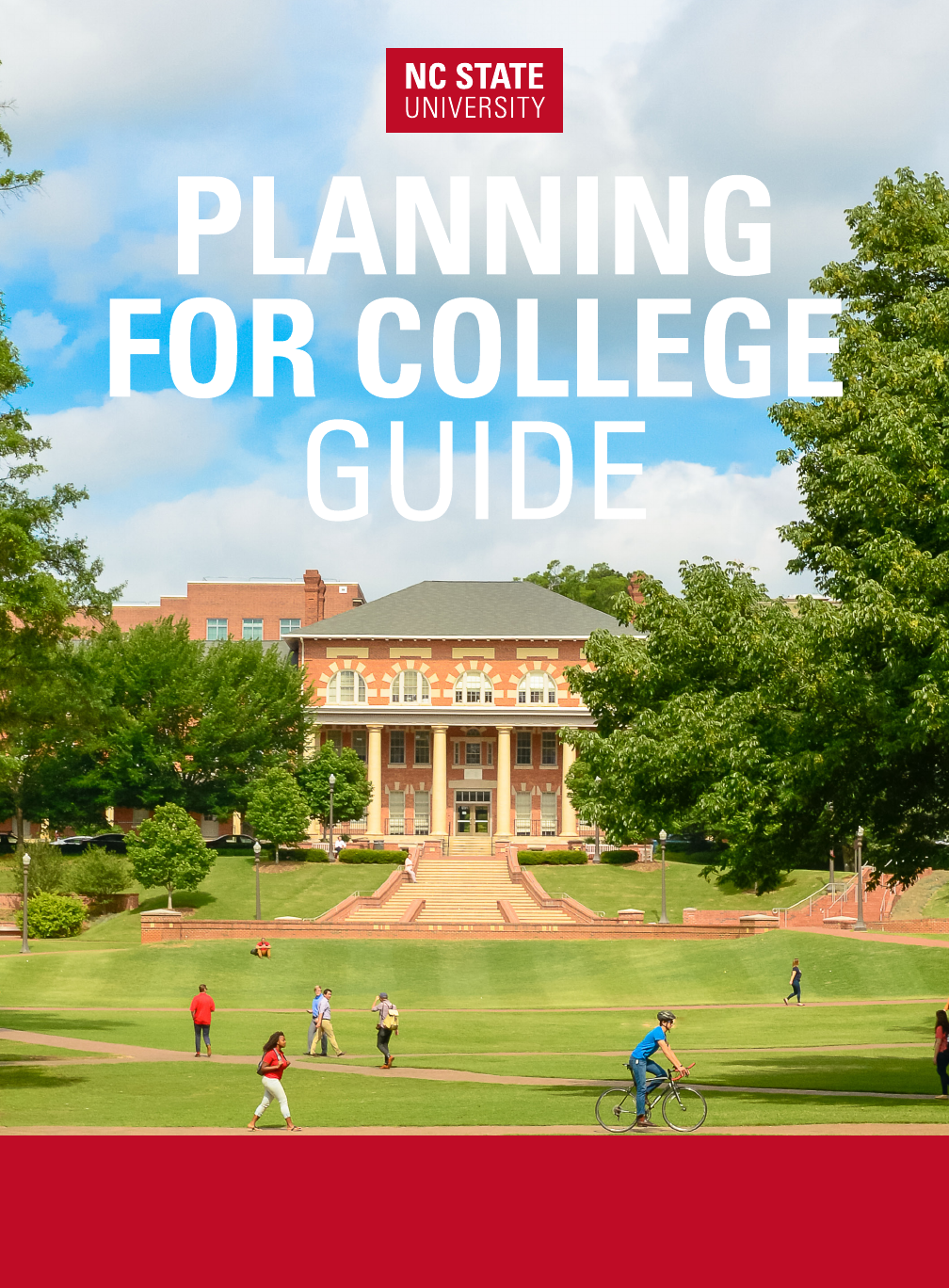
INVEST
IN
YOURSELF
AVERAGE EARNINGS
$88,764
$61,984
$51,896
BACHELOR’S DEGREE
It’s never too early
to start exploring
your college
options!
ASSOCIATE DEGREE
(OCCUPATIONAL PROGRAM)
HIGH SCHOOL GRADUATE
(NO COLLEGE)
INVEST
IN
YOURSELF

Identify Your Support System Consider Your Interests
Find a group of people who will help you
navigate the college search and application
process. Whether it’s your school counselor,
parents, family members, teachers, coaches or
community supporters — they are the key to
your success! Get to know them well as you want
them to be able to highlight your strengths and
abilities when the time comes to ask for letters of
recommendation.
Have you met your school counselor?
What is your parent or family’s familiarity
with college?
Who would write your letters of
recommendation when the time comes?
High school is the time to think about your
interests inside and outside of the classroom.
Exploring your interests will help you choose a
major that leads to a career you are passionate
about. Ask your support network about their jobs
and which industries may be the best match for
your skills and talents.
What is your dream job when you grow up?
What’s your favorite class?
What inspires you?
What are your talents and strengths?
What do you value?
Start the Conversation
Research Institutions Make a Financial Plan
studentaid.gov/understand-aid/types
College is likely one of the biggest investments
you will make - financially and personally. Start
conversations early about how you plan to afford
college and financial aid opportunities. Learn the
differences between grants, loans, work-study
and scholarships.
Will someone help pay for your degree? Do you
need to earn money while in college?
What financial aid deadlines do you need to
meet? What about scholarships?
Would attending a community college before
transferring to a four-year institution be a
more affordable option for you?
With over 5,000 colleges and universities in the
U.S. alone, your opportunities are endless. Where
do you start? Start by identifying your interests
and have honest conversations about how
you plan to afford college to help you narrow
down your options. From there you will also
want to consider size, location, campus life and
academics to find the best fit college for you!
Which colleges offer your major(s) of interest?
Do you want big city opportunities or a
college-town feel?
Which colleges offer the extracurricular
opportunities and resources that are
important to you?

12
TH
GRADE
College Applications
Helpful Links
Finish Senior Year Strong
Now is the time to apply to the colleges
you have identified you are interested in
attending.
□ Mark application deadlines on your
calendar.
□ Aim to apply by early application
deadlines.
□ Take the SAT/ACT again if required for
admission. Make sure the scores will
be available before college application
deadlines.
□ Reach out to your recommenders at
least a month prior to the application
deadline to request a letter of
recommendation.
□ Talk to your counselor about qualifying
for an application fee waiver.
□ College Application Week
cfnc.org/apply-to-college/nc-
countdown-to-college
□ Student athletes: Register with the
NCAA Clearinghouse for eligibility
certification.
A final transcript will be required by the
college where you choose to enroll.
□ Take AP/IB exams.
□ Compare colleges you are admitted to
and the financial aid packages offered.
□ Decide where you want to enroll and
celebrate!
To qualify for federal student aid including
federal grants, work-study and loans, you
should complete the Free Application
for Federal Student Aid (FAFSA). Many
institutions also use FAFSA data to award
their own aid.
□ The FAFSA is available October 1
each year at studentaid.gov.
□ Be aware of colleges’ priority deadlines
for submitting the FAFSA.
□ Find assistance for completing the
FAFSA at cfnc.org/pay-for-college/
fafsa-assistance/.
□ Scholarships: Ask schools about
scholarship application deadlines.
Some require you to apply for
consideration while others will
automatically consider you for
scholarship opportunities.
□ Look for external scholarship
opportunities in your community.
□ Complete your new student checklist.
□ Figure out housing arrangements,
orientation dates and placement
testing requirements.
□ Send enrollment items to your future
college (i.e. official final transcripts, AP/
IB test scores).
Financial Aid
May 1
National Enrollment
Confirmation Deadline
i
□ FAFSA studentaid.gov
□ Common App commonapp.org
□ Coalition App coalitionapp.org
Mark Your Calendar
i

Narrow Down Your College List
Admissions Tip
It is encouraged that you take an English class and a
math class each year.
College Search Tools
NC Colleges and Universities
□ Tour schools: Take time during school breaks to visit colleges
you are interested in. If you aren’t able to visit campuses
in person, many colleges offer virtual tours for you to get a
glimpse of what the campus is like.
□ Attend a college fair: Talk to admissions representatives
from a variety of institutions all in one place. If a college fair
is not hosted at your high school, check college admissions
websites to see when a rep may be in your area.
□ Continue to focus on your academics: Your junior year is
your last full year of grades available on your transcript when
you apply to colleges, although some may ask for your senior
year schedule and grades before making a final decision.
□ Consider taking the ACT or SAT exam: Many colleges and
universities who use test scores in their admission review
allow you to submit multiple exam scores and consider your
highest score or “super score.” To have multiple scores to
submit by fall application deadlines of your senior year, you
should take at least one exam your junior year.
i
i
11
TH
GRADE
Did You Know? In the state of North Carolina, there are:
16 36 58
Public
Universities
Private,
Nonprofit
Institutions
Public
Community
Colleges
□ bigfuture.collegeboard.org □ cfnc.org
□ UNC System northcarolina.edu
□ NC Independent Colleges and Universities ncicu.org
□ NC Community College System nccommunitycolleges.edu

10
TH
GRADE
Helpful Links
Free Test Prep
□ Inquire about AP, IB or dual enrollment courses offered
at your high school: Talk to your school counselor about your
options to make sure you are on track to continue challenging
yourself throughout high school.
□ Consider taking the PSAT or ACT Aspire exam: These
exams will help you prepare for the SAT or ACT.
□ Explore your college options: You can choose to pursue a
two-year associate degree or a four-year bachelor’s degree
after high school. Some students choose to pursue an
associate degree at a community college before transferring
to a four-year university.
□ Use your summers wisely – attend a college program or
camp! Explore colleges, discover your interests, make friends
and maybe even gain some college credit through student
enrichment programs hosted by colleges.
□ Deadlines to apply or register to attend are typically in the
spring. Learn more at www2.cfnc.org/StudentEnrichment.
i
i
□ Student Enrichment www2.cfnc.org/StudentEnrichment
□ Test-Optional Schools fairtest.org
□ ACT act.org
□ Khan Academy khanacademy.org/SAT
Start Thinking Ahead
Did You Know?
Over 1,000 four-year colleges and universities
do not require ACT/SAT scores for admission.
Ask about institutions’ testing policies when researching!
See a full listing of test-optional schools at fairtest.org.
Admissions Tip
We encourage you to create an email address for your college
search that is not your school email.

Make Connections
Admissions Tip
Course and grade point average requirements may vary
depending on the type of institution you are interested in.
Add researching these requirements to your
college search checklist!
□ Start to identify your support system: Tell your
school counselor, parents/family, teachers, coaches,
etc. that you want to go to college.
□ Meet with your school counselor: Discuss courses
required to graduate from high school and attend
college to make sure you sign up for courses that will
put you on the right track.
□ Four units of English
□ Two units of social studies
□ Four units of mathematics
□ Three units of science
□ Two units of the same foreign language
View detailed information at:
□ Get involved in activities after school: Join clubs, play
sports, get a job or volunteer in your community. Balancing
your academics and activities can be tough so just pick a few
you are passionate about.
9
TH
GRADE
UNC System Minimum Course Requirements
i
northcarolina.edu/future-students/admission-requirements

Helping Your College-Bound Student Stay On Track
Use this Planning for College Guide to keep your student on track from the time they begin
high school until they enroll at a college or university.
What classes do you most
enjoy in school?
What are you most interested
in outside of the classroom?
What’s your dream job?
Where do you want to be in
five years?
Are you interested in a two-
year associate degree or a
four-year bachelor’s degree?
Are you interested in going
to school close to home or far
away?
Are you interested in a
smaller college community
or a large campus?
Work with your student to
identify a support team,
which will probably include
their high school counselor.
Your support will be
extremely important to the
success of your student.
Colleges and universities offer both
on-campus and virtual opportunities to help
you explore academic programs and campus.
Check out a school’s website to learn more
about visit options and relevant contact
information for your student.
Schedule campus tours to help your student
see what life is like as a college student.
It’s important for a student to be able to picture
themselves on the campus before making a
decision about where to enroll.
Talk to schools about financial aid and
scholarship opportunities. Pay attention to
deadlines for each institution or college your
student is applying to so they can apply for as
many opportunities as are available to them.
Be prepared to fill out the Free Application for
Federal Student Aid (FAFSA) during the fall of
your student’s senior year.
Research external scholarships that may be
available in your community.
Getting Started
Researching Colleges
Gauge Their Interests
Campus Tours
Discuss College Options
Paying for College
Make Connections
NC State University promotes equal opportunity and prohibits discrimination and harassment based upon one’s age, color, disability, gender identity, genetic information,
national origin, race, religion, sex (including pregnancy), sexual orientation and veteran status. 3000 copies of this public document were printed at the cost of $1.12 per copy.
@ncstateadmissions @applyncstate
Virtual Tour
visit.ncsu.edu
See Yourself at NC State
discover.admissions.ncsu.edu
i

